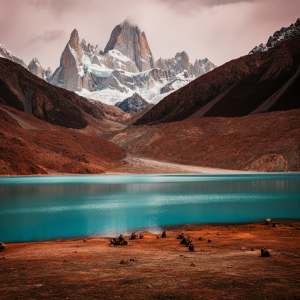Nestled amidst the rugged Himalayan landscape of Mustang, Nepal, Dhumba Lake is a breathtaking natural wonder that has remained largely untouched by the hustle and bustle of modern life. This serene, glacial-fed lake is a true hidden gem, offering visitors a chance to experience the tranquility and beauty of one of the most remote and awe-inspiring regions of the country.
Introduction to Mustang District
Geographical Isolation
Mustang district, located in the northern part of Nepal, is a remote and geographically isolated region. Nestled in the Himalayas, it shares a border with Tibet (China) and is surrounded by rugged mountains, deep valleys, and arid landscapes.
Stock Photos and Videos of Nepal
Shutterstock Alamy Pond5 Dreamstime 500px
Tibetan-Influenced Culture
Mustang has a unique cultural heritage that is heavily influenced by Tibetan Buddhism. The region is home to ancient monasteries, prayer flags, and traditional Tibetan architecture, offering visitors a glimpse into a vibrant and well-preserved culture.
Trekking Destination
Mustang is renowned for its world-class trekking opportunities, attracting adventurous travelers from around the globe. The region offers a diverse range of trekking routes, from the challenging and remote Upper Mustang trail to the more accessible Annapurna Circuit.
Geography and Climate of Mustang
Rugged Terrain
Mustang district is situated in the northern region of Nepal, bordering Tibet. The landscape is characterized by a rugged, mountainous terrain, with towering peaks, deep valleys, and stark, arid landscapes. The region’s geography is shaped by its location in the rain shadow of the Himalayas.
High-Altitude Climate
Mustang experiences a high-altitude, semi-arid climate, with long, harsh winters and short, mild summers. The average elevation ranges from 3,800 to 6,000 meters (12,500 to 19,700 feet), resulting in a cool, dry climate that is heavily influenced by the region’s proximity to the Tibetan Plateau.
Traditional Architecture
The traditional architecture of Mustang reflects the region’s harsh climate and remote location. Homes and buildings are typically constructed using mud bricks, stone, and wood, with flat roofs and thick walls to provide insulation and protection from the elements.
The Dhumba Lake: A Tranquil Oasis
Nestled in the heart of Mustang, Dhumba Lake is a serene and picturesque body of water that offers a peaceful respite from the arid landscapes that characterize this region of Nepal. Fed by glacial meltwater, the lake’s waters are crystal clear, reflecting the rugged surrounding mountains and the vast, boundless sky above.
The lake’s tranquil ambiance is enhanced by the lush vegetation that adorns its shores, providing a lush, verdant contrast to the rugged, barren terrain that dominates the area. Visitors can bask in the serene silence, broken only by the gentle lapping of the water and the occasional call of birds, as they take in the breathtaking vistas that surround this hidden gem.

Unique Features of Dhumba Lake
Crystal Clear Waters
Dhumba Lake is renowned for its exceptionally clear and pristine waters, reflecting the surrounding mountains and sky like a mirror. The water’s purity is a testament to the lake’s remote and untouched location.
Sacred Buddhist Significance
The lake holds deep spiritual significance for Tibetan Buddhists, who believe it to be a sacred site blessed by the presence of enlightened beings. Pilgrims come to perform rituals and offerings at the lakeside monasteries.
Dramatic Mountain Backdrop
Dhumba Lake is nestled amidst the rugged, snow-capped peaks of the Himalayas, creating a breathtaking visual contrast between the serene waters and the towering, majestic mountains that frame the scene.
Flora and Fauna around Dhumba Lake
The serene Dhumba Lake in Mustang, Nepal is surrounded by a lush, thriving ecosystem teeming with diverse flora and fauna. The alpine meadows surrounding the lake are blanketed in a vibrant tapestry of wildflowers, including the iconic blue Himalayan poppies, delicate mountain lilies, and fragrant rhododendrons that bloom in the spring and summer months.
The crystal-clear waters of Dhumba Lake provide a habitat for a variety of aquatic life, including migratory waterfowl like bar-headed geese, Himalayan griffon vultures, and the elusive Tibetan gazelle. The rugged terrain of the Annapurna range that looms over the lake is home to the legendary Himalayan brown bear, as well as the nimble blue sheep and the stealthy snow leopard.
Spiritual Significance of Dhumba Lake
A Sacred Pilgrimage Site
Dhumba Lake holds deep spiritual significance for the people of Mustang. It is considered a sacred pilgrimage destination, attracting devout Buddhists and Hindus who come to offer prayers and seek blessings at the serene lakeside.
Mythological Origins
According to local legends, the lake was formed when a sacred chalice containing holy water was dropped by the gods, creating this profound natural wonder. The pristine waters are believed to possess purifying and healing properties.
Monastic Connections
Several ancient Buddhist monasteries and meditation retreats are situated around Dhumba Lake, creating a profound spiritual atmosphere. Pilgrims often combine their visit to the lake with a stop at these sacred sites to deepen their contemplative experience.
Ritual Ceremonies
Locals perform various ritual ceremonies and offerings at the lake, especially during auspicious festivals and full moons. These rituals are meant to honor the lake’s divinity and invoke blessings of prosperity, fertility, and harmony.
Cultural Traditions and Festivals
Ancient Bon Rituals
Dhumba Lake holds great spiritual significance for the local Bon communities, an ancient pre-Buddhist religion that has deeply influenced the cultural traditions of Mustang. Pilgrims gather at the lake to perform sacred rituals and ceremonies, connecting with the region’s rich spiritual heritage.
Seasonal Festivals
The people of Mustang celebrate various festivals throughout the year, many of which are centered around Dhumba Lake. These include vibrant harvest celebrations, where locals gather to offer prayers, dance, and feast amidst the stunning backdrop of the pristine lake.
Monastic Celebrations
The nearby Buddhist monasteries, such as Tashi Lhunpo, organize special ceremonies and events at Dhumba Lake, drawing devotees from across the region. These events showcase the region’s rich monastic traditions and the deep ties between the local community and their spiritual beliefs.
Accessibility and Transportation
Accessible by Road
The Dhumba Lake area can be reached by road from Jomsom, the main town in Mustang.
Scenic Drives
The drive from Jomsom to Dhumba Lake offers breathtaking views of the Annapurna range.
Trekking Trails
Visitors can also hike to Dhumba Lake along well-marked trekking trails.
Getting to Dhumba Lake is relatively easy, as it is accessible by both road and trekking trails. The scenic drive from Jomsom, the main town in Mustang, takes approximately 2-3 hours and offers stunning views of the Annapurna mountain range. Visitors can also choose to hike to the lake along well-marked trails, which can take anywhere from 4-8 hours depending on their fitness level and the route taken.
Trekking Trails around Dhumba Lake
The Dhumba Lake Loop
The Dhumba Lake Loop is a gentle, 3-4 hour trek that circumnavigates the lake, offering stunning views of the crystal-clear waters and the surrounding Annapurna mountain range. This is an ideal trail for hikers of all skill levels.
The Dhumba Gompa Trail
For those seeking a more challenging trek, the Dhumba Gompa Trail leads hikers up to the historic Dhumba Gompa monastery, perched atop a hill overlooking the lake. The 2-3 hour ascent rewards adventurers with breathtaking panoramic vistas.
The Chhoser Ridge Trek
The Chhoser Ridge Trek is a strenuous 6-8 hour hike that takes trekkers up to the high-altitude Chhoser Ridge, offering unparalleled views of the Dhumba Lake and the surrounding Himalayan peaks. This trail is recommended for experienced hikers only.
Accommodation and Dining Options
Eco-Lodges and Guesthouses
Dhumba Lake is surrounded by charming eco-lodges and guesthouses that offer comfortable and sustainable accommodations. These rustic yet cozy options provide an authentic cultural experience while minimizing environmental impact.
Local Cuisine
Visitors can savor the delectable Tibetan-influenced cuisine of Mustang, featuring hearty momos, thukpa noodle soups, and traditional breads. Many lodges and restaurants source their ingredients locally to support the community.
Camping Adventures
For the more adventurous traveler, camping near Dhumba Lake provides an immersive experience under the stars. Guided camping tours offer the opportunity to connect with nature and explore the surrounding landscapes.
Sustainability and Conservation Efforts
Community Involvement
The local community in Mustang plays a crucial role in preserving the ecological balance around Dhumba Lake. Residents participate in regular clean-up drives and educational programs to raise awareness about sustainable tourism practices.
Responsible Trekking
Trekking companies operating in the region have implemented guidelines to minimize the environmental impact of visitors. This includes proper waste management, stay on designated trails, and educating trekkers on leaving no trace.
Conservation Initiatives
The Nepalese government and environmental organizations have initiated various conservation projects around Dhumba Lake. These include habitat restoration, wildlife monitoring, and establishing protected areas to safeguard the delicate ecosystem.
Challenges Facing Dhumba Lake
Fragile Ecosystem
The delicate ecosystem surrounding Dhumba Lake is under constant threat from human activity, including overgrazing, deforestation, and improper waste management. Maintaining the lake’s pristine environment is a constant challenge for local authorities and conservation groups.
Unsustainable Tourism
The growing popularity of Dhumba Lake as a tourist destination has led to an increase in foot traffic and pollution around the lake. Responsible tourism practices and stricter regulations are needed to preserve the lake’s natural beauty and ecological balance.
Climate Change Impacts
The effects of climate change, such as reduced snowmelt and prolonged droughts, have taken a toll on Dhumba Lake’s water levels. This threatens the lake’s delicate ecosystem and the livelihoods of the local community who rely on it for farming and livestock.
Potential for Eco-tourism Development
Sustainable Infrastructure
Dhumba Lake’s pristine environment presents an opportunity to develop eco-tourism facilities that are in harmony with the natural surroundings. This includes building eco-lodges, hiking trails, and visitor centers using sustainable materials and practices to minimize the environmental impact.
Community Engagement
Engaging the local Mustang community is crucial for developing eco-tourism around Dhumba Lake. This can involve training guides, supporting local businesses, and ensuring that the benefits of tourism are equitably distributed to empower the community.
Educational Experiences
Eco-tourism development around Dhumba Lake can incorporate educational programs that teach visitors about the region’s unique ecology, cultural heritage, and conservation efforts. This can inspire guests to become advocates for preserving the area’s natural wonders.
Responsible Tourism
Strict guidelines and regulations must be implemented to ensure that eco-tourism activities around Dhumba Lake have a minimal impact on the delicate ecosystem. This includes limiting visitor numbers, promoting low-impact trekking, and enforcing waste management protocols.
Preserving the Pristine Beauty of Dhumba Lake
Sustainable Tourism
Promoting eco-tourism practices around Dhumba Lake is crucial to preserve its delicate ecosystem. Responsible visitor management, limiting tourist numbers, and educating travelers on minimizing their environmental impact can help maintain the lake’s pristine natural beauty.
Collaborative Conservation
Local communities, authorities, and conservation organizations must work together to implement effective protection measures. This includes monitoring water quality, regulating fishing and boating activities, and ensuring proper waste management systems are in place around the lake.
Protecting the Flora and Fauna
Dhumba Lake is home to a diverse array of plant and animal life. Safeguarding these species and their habitats through habitat restoration, anti-poaching initiatives, and responsible visitor behavior is essential to maintaining the lake’s ecological balance.
DISCLAIMER: This was generated with the help of AI. This technology is new and constantly improving. Please verify the accuracy before sharing.

